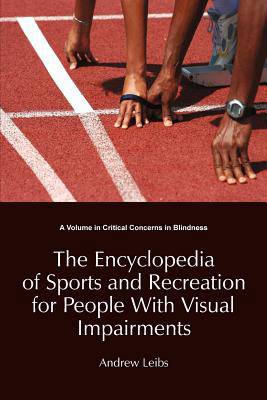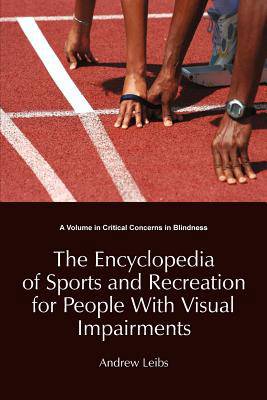
- Retrait gratuit dans votre magasin Club
- 7.000.000 titres dans notre catalogue
- Payer en toute sécurité
- Toujours un magasin près de chez vous
- Retrait gratuit dans votre magasin Club
- 7.000.0000 titres dans notre catalogue
- Payer en toute sécurité
- Toujours un magasin près de chez vous
The Encyclopedia of Sports and Recreation for People with Visual Impairments
Andrew Leibs
84,95 €
+ 169 points
Description
Not long ago, most blind and visually impaired people grew up without ever playing sports; they sat on the sidelines, and kept score during gym-protected rather than included. In the 1980s, few people had ever heard of the Paralympic Games or accessible recreation. Today, promising blind athletes can receive residency at the US Olympic Training Center; runners compete for prize money and national championships, and most ski resorts offer adaptive programs throughout the year where blind people can ski, cycle, and kayak-often for free. The Paralympic movement, the Americans with Disabilities Act of 1990, and ever-increasing expectation for inclusion among the disabled have inspired an explosion of accessible sports, fitness, and recreation programs that accommodate the blind. The Encyclopedia of Sports & Recreation for People with Visual Impairments is the first consumer- focused, action-oriented guide to this new world of accessible activity, profiling the people, programs, and products that are helping move blind and visually impaired people from the sidelines into the game. This groundbreaking guide profiles every accessible blind sport and recreation activity with entries that outline how athletes (both novice and elite) got involved in the sport and how participation has shaped their life. The book also profiles major blind sports organizations and includes chapter and resource listings on camps and accessible recreation providers. Through this book, blind people will be inspired to embrace sports as the rest of society does-as a vital component of personal expression and human interaction that opens paths to adventure, confidence, and lifelong health and fitness.
Spécifications
Parties prenantes
- Auteur(s) :
- Editeur:
Contenu
- Nombre de pages :
- 288
- Langue:
- Anglais
- Collection :
Caractéristiques
- EAN:
- 9781623960407
- Date de parution :
- 31-12-12
- Format:
- Livre broché
- Format numérique:
- Trade paperback (VS)
- Dimensions :
- 156 mm x 234 mm
- Poids :
- 408 g

Les avis
Nous publions uniquement les avis qui respectent les conditions requises. Consultez nos conditions pour les avis.






